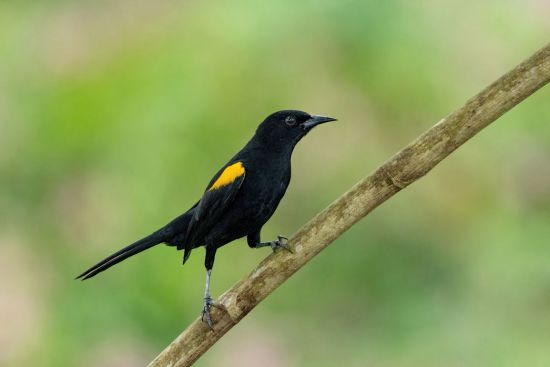(References updated) |
Sbarnhardt (talk | contribs) (Add image by Thibaud as First Image of species to be added to the Opus article for species) |
||
| Line 1: | Line 1: | ||
| + | [[File:Epaulet_Oriole_First-Image_THBD.jpg|thumb|550px|right|Photo © by {{user|Thibaud|Thibaud Aronson}}<br />Puerto Maldonado, Madre de Dios, [[Peru]], 3 June 2022]] | ||
'''Includes Moriche Oriole''' | '''Includes Moriche Oriole''' | ||
;[[:Category:Icterus|Icterus]] cayanensis | ;[[:Category:Icterus|Icterus]] cayanensis | ||
| − | |||
==Identification== | ==Identification== | ||
Mostly black, the epaulet consisting of the upper wing-coverts. | Mostly black, the epaulet consisting of the upper wing-coverts. | ||
| Line 30: | Line 30: | ||
==External Links== | ==External Links== | ||
{{GSearch|Icterus+cayanensis}} | {{GSearch|Icterus+cayanensis}} | ||
| − | [[Category:Birds]][[Category:Icterus | + | [[Category:Birds]][[Category:Icterus]] |
Revision as of 17:10, 30 September 2022
Includes Moriche Oriole
- Icterus cayanensis
Identification
Mostly black, the epaulet consisting of the upper wing-coverts.
Distribution
Colombia, Venezuela, Guianas, Suriname, northern Brazil, Peru, eastern Bolivia and Trinidad.
Taxonomy
Polytypic, consists of two subspecies1:
- I. c. chrysocephalus
- I. c. cayanensis
- Suriname to French Guiana, Amazonian Brazil, eastern Peru and eastern Bolivia
Variable Oriole was formerly included in this species.
Habitat
Woodland, thorny scrub and gardens.
Behaviour
Diet
The diet includes insects and nectar.
Breeding
Its nest is a long hanging basket of grass and other plant fibres, suspended from the end of a branch. 2 dark-spotted pale blue or white eggs are laid.
References
- Clements, J. F., T. S. Schulenberg, M. J. Iliff, B.L. Sullivan, C. L. Wood, and D. Roberson. 2012. The eBird/Clements Checklist of Birds of the World. 6th ed., with updates to October 2012. Ithaca: Cornell Univ. Press. ISBN 978-0801445019. Spreadsheet available at http://www.birds.cornell.edu/clementschecklist/downloadable-clements-checklist
- Sibley, CG and BL Monroe. 1996. Birds of the World, on diskette, Windows version 2.0. Charles G. Sibley, Santa Rosa, CA, USA.
- Birdforum thread discussing the possibility of splitting Variable Oriole from Epaulet Oriole
- Arthur Grosset
Recommended Citation
- BirdForum Opus contributors. (2024) Epaulet Oriole. In: BirdForum, the forum for wild birds and birding. Retrieved 1 June 2024 from https://www.birdforum.net/opus/Epaulet_Oriole




